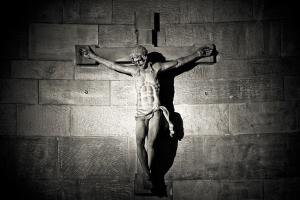
“We are an Easter People, and Alleluia is our song!” – Pope John Paul II.
As Catholics, it is quite easy to fall into a sense of existential comfort. The most important battle – the fight for our salvation – has already been won by Christ. This victory, celebrated most clearly on Easter, cannot be understated. Nevertheless, there is a crucial reason why Catholicism uses a crucifix, not just a cross, as a symbol. It is because Christ’s victory was won not just on the grounds of an empty tomb. It was fought on an instrument of immense suffering, the Cross.
In this paper, I would like to suggest that there is a tension between Easter Sunday and Good Friday. To flesh out this tension, I will utilize two terms from Lutheran theology, theologia gloriae (theology of glory) and theologia crucis (theology of the Cross), and place them within a very Catholic concept: the primacy of the Cross.
Theology of Glory
The theology of glory is essentially the theology of Easter. It emphasizes Christ’s victory as manifested by the Resurrection, which is entirely commendable, as the Resurrection is the single most important event in history.
Catholicism asserts that God became a human being, died by Crucifixion, and was resurrected. The significance of the Resurrection is immeasurable. The Resurrection not only solidified the fact that Christ is God, but in rising from the dead, Christ defeated death, itself caused by original sin.
The importance of Easter as a celebration and honoring of the risen Lord can – and has – been the subject of many books. Saint Paul underscores the magnitude of the Resurrection. “But if Christ is preached as raised from the dead, how can some among you say there is no resurrection of the dead?… And if Christ has not been raised, then empty too is our preaching; empty, too, your faith.” (1 Corinthians 15:12-14).
The theology of glory corresponds with human nature in many ways. We seek to avoid or minimize those things that cause pain or are even just unpleasant. By emphasizing Easter, the theology of glory does just that. After all, what is more unpleasant than “dying in one’s sins”? That is precisely mankind’s fate if Christ did not rise from the dead.
Again, I do not wish to understate the great importance of Easter as the celebration of Christ’s Resurrection and His victory over the sin that binds humanity. However, I suggest it is beneficial to recall that the path to Easter is the Cross.
Theology of the Cross
The Crucifixion acts almost as a counterbalance to the joy and hope elicited by the Resurrection. The significance of Good Friday is not only that it is chronologically prior to Easter (of course) but that it illuminates the importance of “picking up one’s Cross.” We can not, nor ought we try, to deracinate suffering and sacrifice from the redemptive process.
The centrality of the Crucifixion was certainly not lost on the New Testament authors. “For I resolved to know nothing while I was with you except Jesus Christ, and him crucified,” Paul writes in a letter to the Church at Corinth (See 1 Corinthians 2:2). It is also worth noting that the events of the Crucifixion are depicted in all four Gospels.
Because experience dulls us, the belief that God became a human being only to die on the Cross is accepted without much thought. However, the claim that the God of Israel was not only killed but murdered in the most horrendous and cruel way by the powers of this world would have been unthinkable to people of the first century. Yet, this is precisely what Catholicism asserts and holds up for the whole world to see: God crucified.
The Primacy Of The Cross
Why is this so important? Why does Catholicism “keep” Christ on the Cross while at the same time asserting that He has risen? There are several ways to approach these questions; I will briefly mention three.
The first is a reminder that the “Word became flesh.” It makes concrete the historicity of the Crucifixion of Jesus of Nazareth. The death of Christ is not some abstract theological principle or retelling of a myth; rather, it is the depiction of a historical event.
The second reason why Catholics “keep” Christ on the Cross is that there can be no success without suffering, no Resurrection without Crucifixion. Because justice demands restitution for sin, it was necessary for Christ to suffer and die in order to satisfy divine justice.
Finally, the Crucifixion asks that we meditate on the effects of sin and evil. It can be tempting to conceptualize and reason away evil and its effects. Looking upon Christ crucified, however, it becomes much more difficult to ignore the damage, suffering, and death that sin causes. Equally significant is the realization that God became a man, suffered terribly, and was murdered in the most brutal manner imaginable. All of this, the Incarnation, the Crucifixion, the Resurrection, was done to reconcile God and man. It was done because “God so loved the world.”
“We do not pretend that life is all beauty. We are aware of darkness and sin, of poverty and pain. But we know Jesus has conquered sin and passed through his own pain to the glory of the Resurrection. And we live in the light of his Paschal Mystery — the mystery of his Death and Resurrection. ‘We are an Easter People, and Alleluia is our song!’ We are not looking for a shallow joy but rather a joy that comes from faith, that grows through unselfish love, that respects the ‘fundamental duty of love of neighbor, without which it would be unbecoming to speak of Joy.” – Pope John Paul II.
















